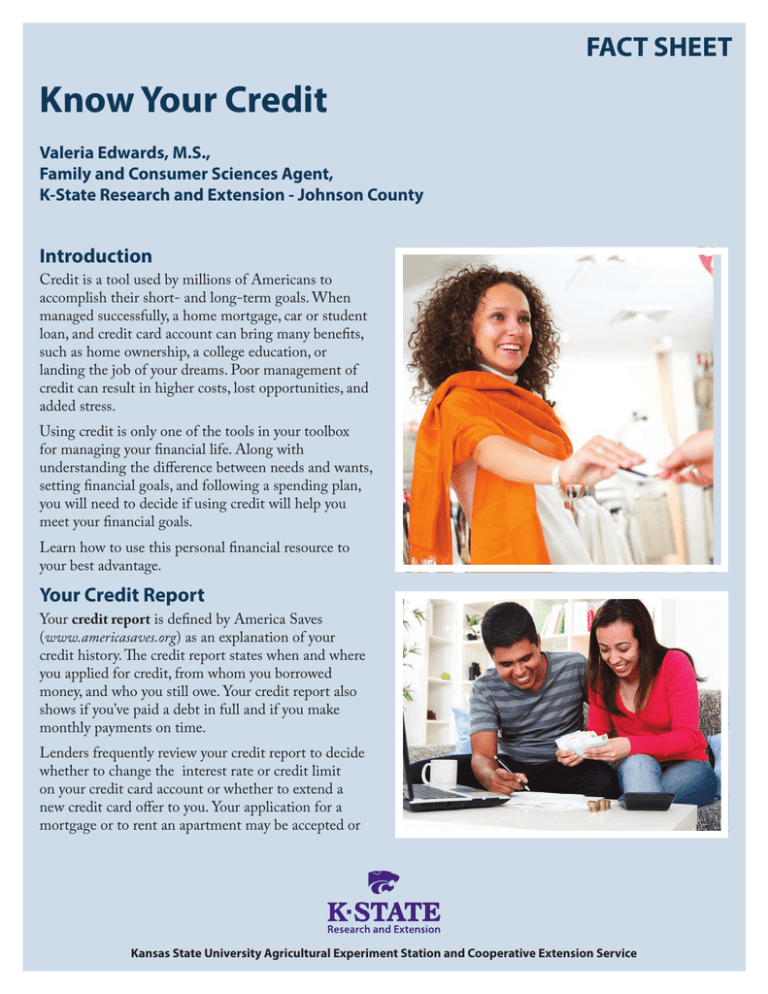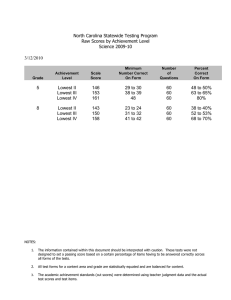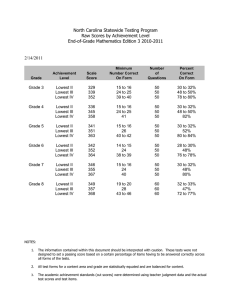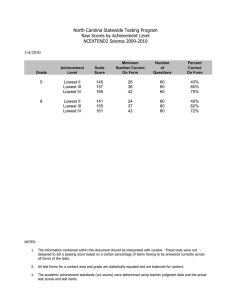
FACT SHEET
Know Your Credit
Valeria Edwards, M.S.,
Family and Consumer Sciences Agent,
K-State Research and Extension - Johnson County
Introduction
Credit is a tool used by millions of Americans to
accomplish their short- and long-term goals. When
managed successfully, a home mortgage, car or student
loan, and credit card account can bring many benefits,
such as home ownership, a college education, or
landing the job of your dreams. Poor management of
credit can result in higher costs, lost opportunities, and
added stress.
Using credit is only one of the tools in your toolbox
for managing your financial life. Along with
understanding the difference between needs and wants,
setting financial goals, and following a spending plan,
you will need to decide if using credit will help you
meet your financial goals.
Learn how to use this personal financial resource to
your best advantage.
Your Credit Report
Your credit report is defined by America Saves
(www.americasaves.org) as an explanation of your
credit history. The credit report states when and where
you applied for credit, from whom you borrowed
money, and who you still owe. Your credit report also
shows if you’ve paid a debt in full and if you make
monthly payments on time.
Lenders frequently review your credit report to decide
whether to change the interest rate or credit limit
on your credit card account or whether to extend a
new credit card offer to you. Your application for a
mortgage or to rent an apartment may be accepted or
Kansas State University Agricultural Experiment Station and Cooperative Extension Service
What Affects a Credit Score?
denied, based on your credit report. Utility companies
may charge deposits based on your credit report. Many
employers check credit reports before extending an
offer for employment or allowing an employee to have
a company-sponsored credit card for company business
expenses.
There are five commonly recognized factors that
influence your credit score:
Payment History — 35 percent: Describes how
consistently you pay your bills by their due date. It is
the most important factor in determining your credit
score.
Your Credit Score
The Consumer Federation of America and Fair Isaac
Corporation (FICO) (www.myfico.com/Downloads/
Files/myFICO_YCS_Booklet.pdf) defines your credit
score as a number that helps lenders and others predict
how likely you are to make your credit payments on
time. Your credit score is based on the information
in your credit report. When lenders talk about “your
score,” they may mean the FICO Score developed by
the Fair Isaac Corporation, which is the most popular
scoring system. Many lenders refer to their own
scoring system, based on their specific lending criteria.
Amount Owed — 30 percent: The amount of credit
you owe your debtors compared to the total amount
of credit available to you. This is known as your “credit
utilization.”
Length of Credit History — 15 percent: The length
of time you have used credit. All open accounts in your
name are considered.
New Credit — 10 percent: The number of recent
credit inquiries and opened accounts.
Types of Credit — 10 percent: Creditors view a
mixture of debt types favorably. A mixture such as a
mortgage, a revolving account such as a credit card, and
an installment loan for a car or student loan would be a
mix valued by creditors.
FICO scores range from 300 to 850, with the higher
the number, the better the score. Most people score
in the 600 to 700 range. In the eyes of most lenders,
FICO scores above 750 are excellent, scores around
700 are good, and scores around 650 are fair. FICO
scores below 600 indicate high risk to lenders. As a
result, they may charge much higher interest rates or
refuse to extend credit at all.
Manage Your Credit Behavior
Pay your bills on time. Set up automatic payments to
your lender. Put payment reminders on your calendar.
Allow plenty of time for a payment to arrive through
the mail and be processed by your lender. Understand
the terms on your loan regarding payment dates, grace
periods, and late fees.
Lenders buy your credit scores from three national
for-profit credit reporting organizations: Equifax,
Experian, and TransUnion.
Credit scores are based on the credit history and
information about an individual on file at each
credit reporting organization at the time the score
is determined. Scores change over time as payment
histories, outstanding balances, and amounts of
available credit change. Creditors have their own
unique scoring models and may not report payment
activity to all three credit reporting organizations.
Keep your credit utilization below 30 percent of
available credit. Pay off debt, but keep accounts
open, especially if they have high credit limits. Use
the accounts you have without opening additional
accounts. Another consideration is your credit card
debt rate. To determine your debt rate, divide your
total monthly credit card payments by your monthly
take-home pay. The University of Illinois Extension
Fact Sheet series “Credit Card Smarts” (web.extension.
illinois.edu/creditcardsmarts/decide_how_much_credit_
is_too_much.cfm?2) states “the average American
has a credit card debt rate of around 12 percent” but
recommends keeping the credit card debt rate at 10
percent or below.
Credit scores affect whether you can obtain credit, as
well as interest rates you pay for credit card purchases,
auto loans, mortgages, and other kinds of credit. This
can directly affect the total price you pay for a good or
service. For most kinds of credit applications, higher
scores mean you are more likely to be approved, and
more likely to pay a lower interest rate on new credit.
Time is on Your Side. The longer your credit history,
and the older each account is, the better. Keep older
accounts open to show a long credit history, unless
there are other factors, such as an annual fee, that add
More information is available at www.consumer.ftc.gov/
articles/0152-how-credit-scores-affect-price-credit-andinsurance.
2
to the cost of credit. In addition, older detrimental
information, such as a missed payment, has less
influence on your credit score than more recent
information.
yourself. Tell the consumer reporting company — in
writing — what information you think is inaccurate.
A sample letter for corresponding with the credit
reporting agencies and creditors can be found on the
FTC website, at consumer.ftc.gov/articles/0058-creditrepair-how-help-yourself.
Acquire New Credit Thoughtfully. Don’t open several
accounts within a short time of each other. Make
payments on new accounts promptly. Applications
for a mortgage, credit card, auto loan, or student
loan result in “hard inquiries” to your credit. Hard
inquiries will likely lower your credit score; however,
when shopping for a mortgage or car loan, the effect
may be minimized when several inquiries are made
within a two-week period. “Soft inquiries” are made by
prospective employers or by creditors to extend a preapproved offer for a credit card or insurance and do not
affect your credit score.
Instead of hiring a company to investigate or repair
information on your credit report, consider using free
qualified expert resources, and do it yourself. Michigan
State University Extension has a publication called You
Can Repair Your Own Credit Report at Little or No Cost
(msue.anr.msu.edu/news/credit_repair_how_to_help_
yourself ).
All accurate information will remain on your report for
seven years. Bankruptcy information remains for 10
years.
Mix it Up. Make all payments to your creditors a
priority. Have some account activity on each credit
card periodically to maintain the account.
A Warning About ‘Impostor’ Websites
The Federal Trade Commission website warns against
“impostor” credit report websites at www.consumer.ftc.
gov/articles/0155-free-credit-reports.
Accessing Your Credit Report
The three national credit reporting agencies are
required by the Fair Credit Reporting Act to provide
a consumer with a free copy of his or her credit report
each year. You may obtain your free credit report at
www.annualcreditreport.com or call 1-877-322-8228.
Requesting your credit report from a different credit
reporting agency on a rotating basis every four months
allows you to review your credit history frequently and
regularly without charge. If you request your credit
report from a single credit agency more than once
during a 12-month period or if you want to learn your
credit score, you will be charged for that information.
Charges are minimal, usually less than $10. A short
video about obtaining your credit report can be found
at www.consumer.ftc.gov/media/video-0060-your-sourcetruly-free-credit-report-annualcreditreportcom.
Websites that claim to offer “free credit reports,” “free
credit scores,” or “free credit monitoring” are not part
of the Fair Credit Reporting Act. The “free” product
may come with strings attached. For example, you may
have to pay a monthly charge unless you cancel before
a trial period ends.
Some “impostor” sites use terms like “free report” in
their names. Others have URLs that purposefully
misspell www.annualcreditreport.com in the hope that
you will mistype the name of the official site and be
directed to their site, so they can attempt to sell you
something or collect your personal information.
The CARD Act
The Credit Card Accountability, Responsibility, and
Disclosure (CARD) Act of 2009-2010 is considered by
many industry experts to be the single largest reform
imposed on the credit card industry (a.k.a. Public Law
111-24). Major provisions of the CARD Act:
Reviewing Your Credit Report
Checking the accuracy of information on your credit
report will be your next step. Make sure your name
is spelled correctly and your social security number is
accurate. Be sure you have knowledge of all accounts
listed and balances are accurate. There should not be
any inquires made by creditors you are unfamiliar with.
•Restrict promotion and issuance of credit cards
to those under 21. msue.anr.msu.edu/news/specific_
protections_for_young_adults_from_credit_cards
•Ban “universal default.” (Credit card issuers can no
longer raise a customer’s interest rate to a penalty
or default rate — often 24 percent to 32 percent —
because of late payments to another creditor on an
unrelated account.)
What if you find inaccurate or incomplete information
on your credit report? The Federal Trade Commission
(www.ftc.gov) recommends specific actions you can
take to repair an inaccurate or incomplete credit report
3
•Control how late fees can be charged.
Cost of Credit
•Regulate various aspects of communication
between the credit card company and account
holders.
There is a cost associated with buying on credit,
even though many people don’t realize it. If you pay
$500 for an item with a credit card, then make only
minimum payments each month (typically 4 percent
of the balance) and don’t charge anything else to the
account, it will take nearly three years to complete
paying for the item. With an 18 percent annual
percentage rate (APR) you will pay over $130 in
interest. So, the next time you think about buying an
item, consider whether you would really want to pay 25
percent more for it, as in this example.
•Require credit card companies to disclose on the
billing statement how long it would take to pay off
the existing account balance and the total interest
cost if only required minimum payments are made.
An excellent summary of the CARD Act is provided
by Barbara O’Neill, Ph.D., CFP, Rutgers Cooperative
Extension at www.extension.org/pages/25260/the-cardact:-what-you-need-to-know.
Choosing a Credit Card
When choosing a new credit card, there are important
considerations. Credit card offers must disclose the
annual percentage rate (APR), the length of the grace
period, all other fees and charges, and the method for
computing the balance for billing on the account. This
information must appear in an easy-to-read box called
the “Schumer Box,” named for Sen. Charles Schumer,
who sponsored the 1988 law requiring this disclosure.
The disclosed information is important because it
can help you determine what a particular credit card
account may cost, based on how you will use the card.
Credit card companies may offer a rewards program
as an enticement for using their card. If you want a
rewards program, look for one that allows you to earn
at places where you already shop, and redeem rewards
in various ways, including cash, travel credits, and gift
cards. Be aware that a low interest rate, reasonable fees,
and no annual card fee may give you more value than a
rewards program.
Useful publications on this subject include University
of Florida Extension’s You and Your Credit: Credit
Card Basics (edis.ifas.ufl.edu/fy1065) and Michigan
State University Extension’s Choosing a Credit Card,
Information and Confidence Count (msue.anr.msu.
edu/news/choosing_a_credit_card_information_and_
confidence_count), which includes a link to the text of
the Schumer Box.
Publications from Kansas State University are available at: www.ksre.ksu.edu
Publications are reviewed or revised annually by appropriate faculty to reflect
current research and practice. Date shown is that of publication or last revision.
Contents of this publication may be freely reproduced for educational purposes.
All other rights reserved. In each case, credit Valeria Edwards, Know Your Credit,
Fact Sheet, Kansas State University, August 2013.
PowerPay (www.powerpay.org) is a useful website
developed by Utah State University Extension. With a
few simple data entries, you can see the true cost of an
item, or build your own debt elimination plan.
The Hidden Cost of Credit
Research has validated the phenomenon of a “credit
card premium,” or the willingness to pay more for an
item when it is purchased with a credit card instead of
cash. In one study, auction participants who were told
they could pay with a credit card submitted bids for
basketball game tickets that were nearly twice as high
as the average cash bid. Another study correlated more
impatient behavior with lower credit scores.
A way to counteract this phenomenon and avoid
impulse credit card purchases might be to leave your
credit card at home instead of carrying it in your
wallet. Consider using a credit card wrapper showing
your goals for spending, which could prompt you to
evaluate if the impulse purchase fits your spending
goals before actually making the purchase. Avoid
Internet auctions or TV shopping channels to reduce
your susceptibility to the “credit card premium.”
Author
Valeria Edwards, M.S., Family and Consumer Sciences
Agent, K-State Research and Extension - Johnson
County, valeria.edwards@jocogov.org
Kansas State University Agricultural Experiment Station and Cooperative
Extension Service
K-State Research and Extension is an equal opportunity provider and employer.
Issued in furtherance of Cooperative Extension Work, Acts of May 8 and June
30, 1914, as amended. Kansas State University, County Extension Councils,
Extension Districts, and United States Department of Agriculture Cooperating,
John D. Floros, Director.
MF3081
August 2013



